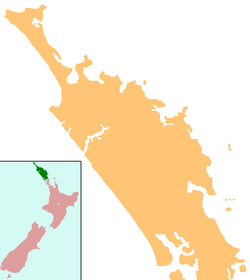Whirinaki, Northland
Whirinaki | |
|---|---|
| Coordinates: 35°28′26″S 173°27′45″E / 35.47389°S 173.46250°E | |
| Country | New Zealand |
| Region | Northland Region |
| District | Far North District |
| Population (c.2005) | |
• Total | 200 |
Whirinaki is a locality on the Whirinaki River in the south Hokianga, in Northland, New Zealand. The name means "to lean against a support".[1] Highway 12 runs through it. Opononi lies to the south west, and Rawene lies to the north east.[2][3]
It is part of the Hokianga South statistical area, which covers the southern side of Hokianga Harbour between Rawene and Koutu. For demographics of this area, see Rawene.
History and culture
[edit]Whirinaki was raided by Te Roroa in 1810 or 1811, during the Musket Wars. All the inhabitants of Opara village were killed.[4]
The area has three marae associated with Ngāpuhi hapū:[5]
- Mātai Aranui Marae are affiliated with Ngāti Kairewa, Ngāti Kerewheti, Ngāti Te Pou, Te Hikutu and Te Whānau Whero.
- Mōria Marae are affiliated with Ngāti Kairewa, Ngāti Kerewheti, Ngāti Te Pou, Ngāti Tuapango, Te Hikutu and Te Whānau Whero.
- Pā te Aroha Marae are affiliated with Ngāti Kairewa, Ngāti Kerewheti, Ngāti Te Pou, Ngāti Tuapango, Te Hikutu and Te Whānau Whero.[6]
Education
[edit]
Te Kura Kaupapa Māori o Te Tonga o Hokianga is a coeducational full primary (years 1–8) school[7] which has a roll of 147. It is a Kura Kaupapa Māori school which teaches fully in the Māori language.
There was a Whirinaki Native School during the early-mid 20th century.[8]
35°28′26″S 173°27′45″E / 35.47389°S 173.46250°E
Notes
[edit]- ^ "Ngā Puhi - Ancestors". Te Ara: The Encyclopedia of New Zealand. Archived from the original on 12 February 2008. Retrieved 29 January 2008.
- ^ Peter Dowling, ed. (2004). Reed New Zealand Atlas. Reed Books. pp. map 6. ISBN 0-7900-0952-8.
- ^ Roger Smith, GeographX (2005). The Geographic Atlas of New Zealand. Robbie Burton. pp. map 22. ISBN 1-877333-20-4.
- ^ Smith, Stephenson Percy (1910). "Further Wars on the Border-Land". Maori Wars of the Nineteenth Century. p. 52. Archived from the original on 1 February 2023. Retrieved 1 February 2023.
- ^ "Māori Maps". maorimaps.com. Te Potiki National Trust. Archived from the original on 22 January 2019. Retrieved 25 February 2019.
- ^ "Te Kāhui Māngai directory". tkm.govt.nz. Te Puni Kōkiri. Archived from the original on 18 January 2020. Retrieved 25 February 2019.
- ^ Education Counts: Te Kura Kaupapa Maori o Te Tonga o Hokianga
- ^ Lange, Raeburn (1999). May the People Live: a history of Maori health development, 1900-1920. Auckland University Press. p. 76. ISBN 1869402146.

